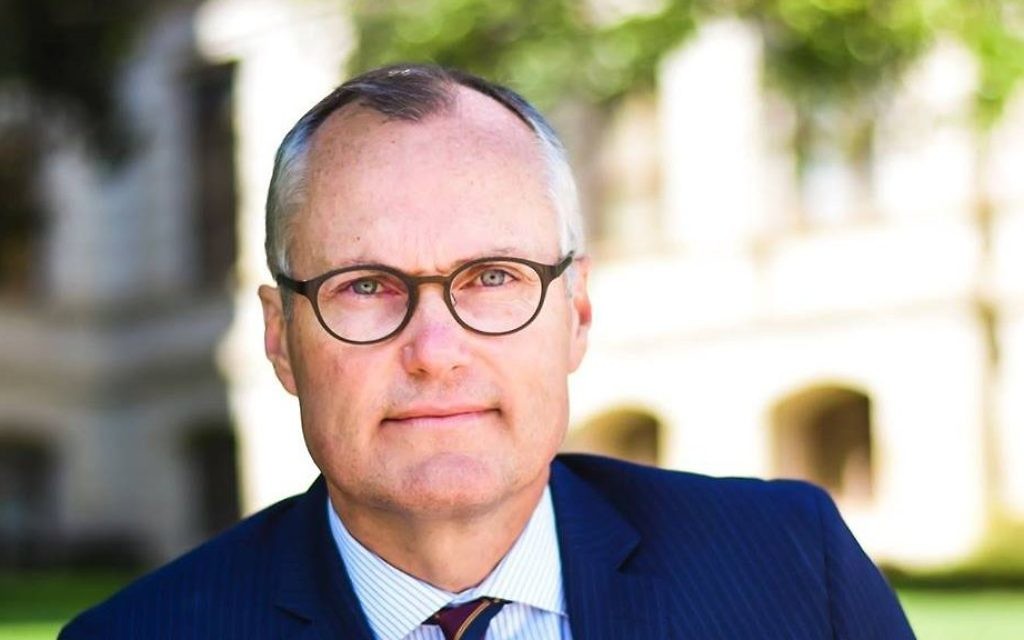Cagle Emphasizes Experience, Promises 500K Jobs
After 12 years as Georgia's lieutenant governor, he says he's ready for the next step.
This is one of five profiles of Republican candidates for Georgia governor. In each, the AJT seeks the candidate’s views on issues of particular interest to the Jewish community. See links to the other four profiles, as well as our dual profile of the two women seeking the Democratic nomination, below.
Seventh-generation Hall County resident and Gainesville native Casey Cagle says the past 12 years as lieutenant governor have prepared him to become the next governor of Georgia as he heads into the Republican primary Tuesday, May 22.
Cagle served during Gov. Sonny Perdue’s second term from 2007 to 2011 and with Gov. Nathan Deal since then. During that time, Cagle said, he has witnessed the state go through downturns, including the 2008 recession, but also upturns through public policies that have helped Georgia maintain a strong economic run the past five years.
Get The AJT Newsletter by email and never miss our top stories Free Sign Up
For Cagle, a new vision for Georgia that focuses on building infrastructure and sustaining economic growth is key. He is looking beyond the construction of roads and bridges to align education with industry needs and provide more options and choices for students so Georgia can build a world-class workforce.
“My commitment is 500,000 jobs in the first four years, along with streamlining government through zero-based budgeting, which will allow us to create greater efficiency and continue to cut taxes.” Cagle said. “Being a low-tax state is important to our prosperity, and we have reduced taxes from 6 to 5.5 percent on state income, which I believe we can continue to lower going forward.”
Read about the other leading Republicans in the governor’s race:
As lieutenant governor, Cagle has created the College and Career Academies, 46 institutions across the state that serve over 40,000 students. Instead of high school diplomas, which would be worth wages of $16,000 a year, students get industry certifications and two-year degrees, enabling them to earn $40,000 a year, he said.
Cagle said he hopes to expand the academies so that every student in Georgia has similar options, as well as different apprenticeship opportunities.
He said he was deeply involved in the passage of House Bill 217, which expands the cap on the tax credit for donations to scholarship organizations supporting private schools, including Jewish day schools and preschools, from $58 million a year to $100 million.
“I was happy to lead on raising the $58 million to $100 million,” Cagle said. “Obviously, this is a great tool that gives more choices and options both to parents and our children as well.”
Come May 22, Cagle said, voters will have to decide who has the experience and knowledge to govern the state and solve the problems that arise. After 12 years as the No. 2 guy, he said what distinguishes him from the other candidates is not just his experience balancing budgets and leading on important issues, but also his negotiation of complex policy issues from a legislative standpoint and an economic development perspective.
To that end, Cagle said the state can pursue multiple endeavors to strengthen ties between Israel and Georgia, including following the example Deal set in 2014 and leading a business delegation to Israel.
Cagle said he also wants to ensure that the Jewish community in Georgia has a strong voice and a seat at the table with his administration.
Cagle was a driving force behind the passage of this year’s Senate Bill 356, which aims to strengthen financial and legislative support for the Georgia Commission on the Holocaust and to move toward a state Holocaust memorial, as well as 2016’s S.B. 327, which bans Georgia from conducting business with entities that boycott, divest or sanction Israel.
“I think there are multiple ways, both economically and socially, by which we can positively impact our relationship between Israel and Georgia,” he said. “We do not condone businesses and others that hold a grudge toward Israel. Georgia obviously holds a very special relationship and place with Israel we all need to recognize.”
Every crime should receive a punishment equal to the crime itself, Cagle said about this year’s unsuccessful push to enact a hate-crimes law. But he also said people should be mindful that crimes against minorities cannot and will not be tolerated in Georgia.
“I’m certainly open to the context of finding ways in which we can be more sensitive in the area of hate crimes,” he said. “But by the same token, crime is bad and something we do not want in any way, so I would come down on the side of being very hard on the issue.”
Cagle said he would sign religious liberty legislation if given the chance as governor. Deal vetoed such a bill in 2016 and remained a clear obstacle the past two legislative sessions. The bills debated in recent years have raised concerns about discrimination against LGBTQ people, and rabbis have been vocal in opposition to the proposals.
But Cagle said Georgia law should match federal law on religious freedom. “This is already the law of the land, meaning the law of the nation, and I think quite honestly it would be the right direction for Georgia to follow,” he said. “I am not for discrimination in any way or any form, which includes discrimination against any person and their beliefs.”
More on the governor’s race:





comments